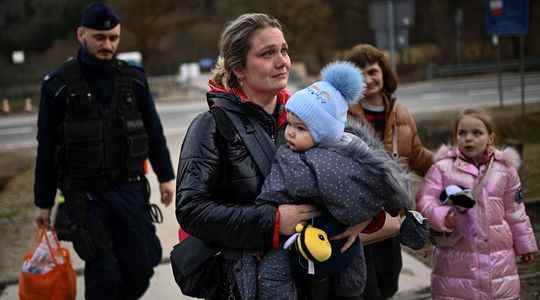Accusations of war crimes accumulated, Friday, May 13, against the Russian army in Ukraine. Already a week earlier, on May 6, a detailed 44-page Amnesty International investigation found that Russian forces should be brought to justice for war crimes committed in Ukraine.
The acts of the Russian army will be the subject of investigations, in particular by the special commission of the UN Human Rights Council, which received the green light on Thursday, the International Criminal Court and the authorities. Ukrainians. Added to this is the forced displacement of thousands of people to “filtration camps”, while more than six million Ukrainians have fled their country since the start of the war.
- Washington accuses Moscow of forcibly transferring “several thousand” Ukrainians to Russia
The United States on Thursday accused the Russian army of having “forcibly” transferred “several thousand” Ukrainians to Russia since the start of the war in late February, often through “filtration camps” where they are held. subjected to “rough” treatment.
Kyiv put forward the number of 1.2 million people deported by Moscow to Russia. The Ukrainian authorities also denounce the existence of Russian “filtration camps”, often in the territories controlled by Russia in eastern Ukraine, through which these “deportees” pass.
“If only from Mariupol”, a strategic port city now almost controlled by Russia, “we estimate that Russian forces have forcibly displaced several thousand civilians into Russian territory”, declared the American ambassador to the Organization for Security and Cooperation in Europe (OSCE) Michael Carpenter in a speech delivered in Vienna, according to the transcript released by the US State Department.
- More than six million Ukrainian refugees abroad
More than six million Ukrainians have fled their country since the beginning of the invasion by the Russian army on February 24, said the High Commissioner for Refugees (UNHCR) in Geneva. As of May 11, 6,029,705 Ukrainians had sought refuge, first in neighboring countries, before often continuing their odyssey, according to the dedicated UNHCR website. Poland hosts by far the largest number of refugees (3,272,943 as of May 11).
Women and children represent 90% of these refugees, men aged 18 to 60, likely to be mobilized, not having the right to leave. The daily flow of refugees has considerably reduced since the outbreak of hostilities.
- Ukraine: Russian forces accused of war crimes in the Kharkiv region
Ukrainian authorities and witnesses interviewed by AFP on Thursday accused Russian forces of firing a tank at a house in a village near Kharkiv, in the east of the country, killing several civilians. The American channel CNN for its part published, also Thursday, what it presents as video surveillance images showing two Ukrainian civilians shot in the back by Russian soldiers.
The scene, which takes place near a car dealership on March 17 on the outskirts of kyiv, shows a group of five soldiers searching the two men before letting them go. When they leave, two soldiers shoot them in the back.
- For OPEC chief and Maduro, oil should not be a “weapon” of sanctions
The Secretary General of the Organization of the Petroleum Exporting Countries (OPEC) and the President of Venezuela have urged world leaders not to use oil as a political “weapon”. Mohammad Barkindo and Nicolas Maduro discussed at the presidential palace of Miraflores, in Caracas, for an hour and a half, agreeing that oil should “not be politicized”.
“I would like to take this opportunity to respectfully call on leaders to uphold OPEC’s core principles…that oil must be depoliticized, oil cannot be used as a political or punitive weapon. “, estimated Mohammed Barkindo.
A position taken up in stride by the Venezuelan president who stressed that both oil and gas should be excluded “from all types of sanctions”.
- Presentation in Cannes of the last film of a director killed in Mariupol
The latest film by Lithuanian director Mantas Kvedaravicius, killed in early April in Mariupol in Ukraine where he had shot it, will be presented out of competition at the Cannes Film Festival, which announced it on Thursday.
“Mariupolis 2” (1:45), which “shows the life that continues under the bombs and reveals images as tragic as they bring hope”, has been added to the official list of films, just a few days before the opening of the 75th Cannes Film Festival, Tuesday.
It will be screened on May 19 and 20, it is specified in a press release. The entire Festival program will have the war in Ukraine as a backdrop, inevitably “in everyone’s mind”, according to its general delegate Thierry Frémaux.
- The G7 must protect poor countries from the effects of the war in Ukraine
The most disadvantaged countries must be protected from the repercussions of the war in Ukraine, the German Foreign Minister said Thursday at the opening of a meeting with her G7 counterparts in northern Germany.
“As the most industrialized countries, we have a special responsibility,” insisted Annalena Baerbock in a statement in Wangels, on the shores of the Baltic, marking the start of a meeting which lasts until Saturday. The ministers will notably discuss the means of “unblocking grain blockade“provoked by Russia.
